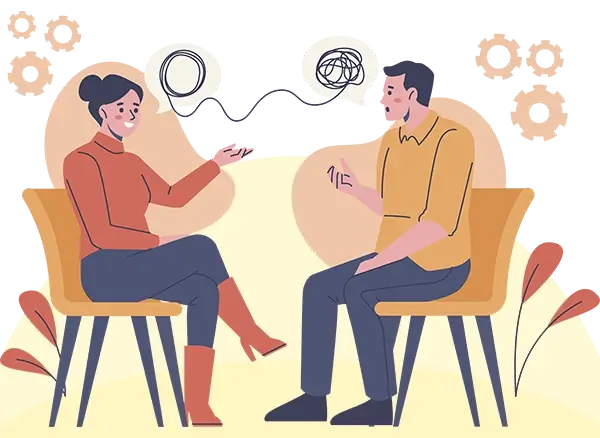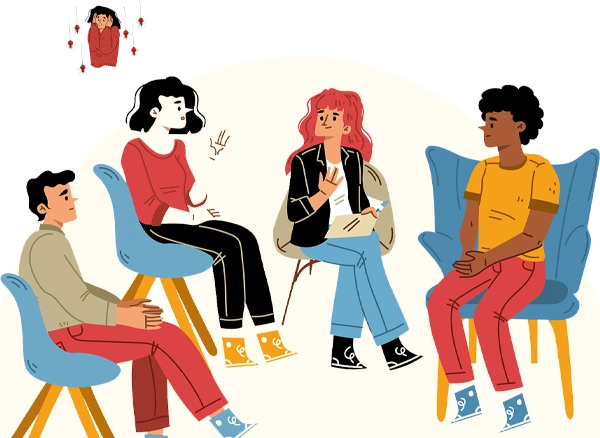Learn whether you may be living with Social Anxiety with this expert-reviewed test. After receiving your results, you’ll have the opportunity to learn more about your symptoms and talk to a licensed therapist.
Begin TestThis mental health assessment is not a diagnosis or a substitute for licensed therapy. You can schedule with a qualified mental health professional here.
Around 7% of adults have Social Anxiety Disorder in the U.S. Prevalence in young adults and adolescents is a little higher, around 9%. It is a relatively common disorder, and you may have heard people dismiss your anxieties as “Well, everyone gets anxious sometimes!” But is this really true? Sure, few people really enjoy public speaking, but Social Anxiety Disorder is a whole other level of fear, avoidance, and hyperfixation on minute social interactions. This free, online screening for Social Anxiety Disorder is not a substitute for a diagnosis provided by a trained mental health professional. It is, however, a way to gauge the likelihood that you have Social Anxiety Disorder. The questions are pulled from DSM-5 criteria and are therefore a good tool to understand your behaviors, emotions, and reactions. Remember, Social Anxiety is a complex disorder that cannot be summed up by these 10 questions.
Begin Test
Social Anxiety Disorder involves the fixation and fear of being humiliated, embarrassed, or negatively perceived in public by your peers or strangers. This anxiety can result in avoidance behaviors, timidness, hesitation to pursue your goals, and severe impairment. Panic attacks are also common in Social Anxiety Disorder.
There isn’t one single cause for Social Anxiety Disorder, and researchers are still trying to figure out how all the different factors work together. It’s thought genetics carries some part, as social anxiety tends to run in families. The environment and stressful triggers are also thought to be a causes of Social Anxiety Disorder.
Fortunately, Social Anxiety Disorder is highly treatable. Through talk therapy and sometimes medication, most people with Social Anxiety Disorder are able to fully recover. Talk therapy is effective at working through the cognitive distortions that are common with the disorder. Rejection sensitivity training and exposure therapy can also help people overcome their fears.
Remember that this assessment is not a substitute for a licensed mental health professional diagnosing you with Social Anxiety. You may have experiences that align with Social Anxiety but are out of the scope of this short test. Therefore, it is wise to always seek an outside, professionally licensed opinion in addition to this test.
Social Anxiety can be a very isolating experience. It can feel like no one else understands what you’re going through. You are not alone. Therapists trained in Social Anxiety can help you meet your goals.
Find a Therapist

Social anxiety disorder can be treated with therapy, medication, or a combination of both. Cognitive Behavioral Therapy (CBT) facilitated by a licensed anxiety therapist, is very effective, and social anxiety in general has a high recovery rate.
CBT for social anxiety helps people challenge negative thoughts, gradually face social fears, and develop coping skills. Mindfulness, relaxation techniques, and social skills training can also support recovery. In some cases, doctors may prescribe medication such as SSRIs.
Social anxiety often brings intense fear, worry, or self-consciousness in social situations. At its worst, it can feel like you might die if you experience rejection or embarrassment from your peers.
Common symptoms include a rapid heartbeat, sweating, trembling, nausea, or feeling “frozen.” It can also involve panic attacks. Mentally, it may involve overthinking, fearing judgment, or imagining worst-case scenarios during interactions.
The exact cause of social anxiety is unknown, and it can vary from person to person. Most researchers agree it arises from a mix of genetics, brain chemistry, temperament, and life experiences. Negative social experiences, trauma, or overprotective environments can all contribute. It is usually a blend of biological and environmental factors, like bullying, a shy personality, or a bad social experience.
If fear or anxiety in social situations is intense, persistent, and disrupts your daily life, such as work, school, or relationships, you may have social anxiety disorder. A therapist or psychiatrist can provide a professional evaluation to confirm the diagnosis and suggest treatment.
Interested in learning more about social anxiety disorder? Read this blog on how to recognize social anxiety in yourself.
Shyness is a personality trait that may cause mild discomfort in social settings, but it generally does not significantly disrupt life. Social anxiety disorder is more severe. It involves ongoing fear, avoidance, and distress that affects daily functioning. Social anxiety disorder often involves a hyperfixation on specific events or potential outcomes. For example, refusing to eat in public, use public restrooms, or speak in front of others are examples of social anxiety, not shyness.
While you can recognize signs of social anxiety, self-diagnosis is not reliable. Only a qualified social anxiety disorder therapist can provide an accurate diagnosis and recommend appropriate treatment.